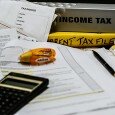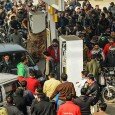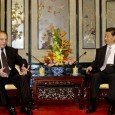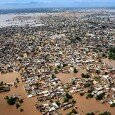By Mehtab Haider –
How can an already beleaguered government impose tough IMF condinalities like the 7% surge in electricity tariff in coming weeks to receive held-tranches of loan
Lingering uncertainty on political horizon of the country due the sit-ins by PTI and PAT, has severely damaged the ability of Nawaz-led government to undertake key and tough structural reforms to keep the IMF sponsored bailout package of $6.67 billion on track.
The entering of IMF program into danger zone can further compound the economic difficulties of Islamabad’s economic managers as weakening of government is likely to severely compromise its ability to ensure delivery on tough IMF conditionalities.
Having no doubt in mind, the PML-N led government managed the economic crisis by boosting country’s foreign currency reserves, though, largely through obtaining foreign debt and $1.5 billion gift from Saudi Arabia after assuming reins of power. But all this stability has started disappearing because of political instability as well as devastating floods.
Now Pakistan’s economic woes have been increasing in the wake of rising twin deficits on accounts of current account deficit (CAD) because of dried up of foreign inflows of $2.4 billion because of continuous sit ins and possibility of hiking in fiscal deficit mainly because of growing financial requirements to compensate negative impacts of devastating floods. The government has envisaged CAD at $3.2 billion for whole financial year 2014-15 but it surged to $1.3 billion in just first two months mainly because of steep fall in exports and unprecedented increase in imports.
“I am feeling headache by witnessing such a massive trade deficit in the wake of fall in exports and surge in imports that resulted into piling up of current account deficit,” Pakistan’s former finance minister and renowned economist Dr Hafeez A Pasha said while talking to Pique.
Pakistan’s exports have been contracted by 4.5 percent in the period March-July 2014 as against expansion of 2.8 percent in the last quarter of 2013-14. Pakistan also registered lowest ever exports in the last quarter in 2013-14 since 2011. The country’s exports of $1.9 billion in August 2014 are the lowest on month to month basis in last six years.
However, the inability of the government has started appearing on the external front of the economy as current account deficit surged by 136 percent in first two months (July and August) and touched $1.3 billion in fiscal year 2014 15 against $580 million in the same period of the last financial year.
A widening current account deficit is altogether not considered as a bad sign for any economy until and unless the country possesses the capacity to finance this ballooning deficit. But in case of Pakistan, it was a worrying indicator because of stalled talks between Pakistan and the IMF in the aftermath of political uncertainty that pushed the Washington-based Fund to go into the mode of “wait and see” till the outcome of this heightened political temperature.
The inability of the government to resolve this political impasse is now starting playing havoc with the economy of this country. Owing to inability of the government to accomplish fourth review of the IMF program that was supposed to review the performance for the period of March-June 2014 well on time, the foreign currency reserves might further draw down in next couple of months as there would be no IMF inflows even implementing all conditions till early December 2014.
The exchange rate that was already under pressure might further aggravate in coming months so the government will have to come with Plan-B to jack up the dwindling foreign currency reserves. The foreign currency reserves, which had touched $14.5 billion, now dropped around $13.5 billion in last one and a half month period.
On fiscal side, the government will have to meet its ambitious FBR’s tax collection target as well as non tax revenue target during the current fiscal year in order to avoid massive slippages. It will be daunting task for the government to put the tax managers on toes as slippages will aggravate fiscal difficulties of the country.
Now the government has been left with no other options but to request the IMF to combine fourth and fifth review under 36 months Extended Fund Facility (EFF) but Islamabad will have to deliver to implement all structural reforms as well as prior actions to qualify for both tranches worth $1.1 billion.
Pakistan and the IMF could not conclude fourth review under the three-year EFF by the end of September 2014 and now the fifth review would become due from third week of October 2014 to gauge the economic health of the country during the period from July to September 2014.
“It seems feasible to club the fourth and fifth review of IMF Program but it depends upon the ability of the government whether it can deliver on all key conditions or not because major failure in meeting condition will prove the release of fifth and sixth tranches more difficult for the IMF’s Board to approve $1.1 billion,” said finance ministry high ups in background discussions with Pique.
When contacted, renowned economist Dr Ashfaque H Khan said: “It appears that the government has become weak after the lingering political crisis in the country so the government will have to deliver on all IMF condition to resume its lending”. He said that Pakistan would have to increase power tariff, approve fresh SBP Act from Parliament and implement privatization plan in order to keep the IMF inflows on track. “The time has come to ensure delivery instead of making only big claims,” he maintained.
To build Pakistan’s case in front of IMF staff, Pakistan will have to meet tough conditions such as raising electricity tariff by 7 percent, approving amendments of SBP Act from Parliament, introducing substitution to Gas Infrastructure Development Cess (GIDC) which was strike down by the Supreme Court of Pakistan and moving on privatization fronts in more vigorous manner.
Islamabad’s economic managers will have to increase electricity tariff by at least 7 percent as the IMF puts it as prior action to accomplish the incomplete fourth review. Earlier, there was 4 percent proposed increase in power tariff but the government remained unable to raise the tariff keeping in view difficulties on political front. Instead of raising the power tariff, the PML-N led government had decided to put this decision on hold which paved the way for requirement of raising tariff by 7 percent.
Pakistan and the IMF would have to evolve consensus on exact timeframe for hiking electricity tariff on the basis of NEPRA’s determination done in June on the basis of 2013-14.
The NEPRA hiked tariff by 43 paisa per unit under Fuel Price Adjustment (FPA) in recent weeks because the government had to heavily rely upon thermal power generation last month on eve of Ramadan and Eid days. But the countrymen will have to face another electricity shock in the range of 7 percent in next couple of months as it is among the prior action of the IMF program.
The economic managers will have to introduce its alternate plan for raising revenues in the aftermath of the Supreme Court of Pakistan’s decision to knock down GIDC on gas sector. Either the government will have to raise tax revenues or reduce the expenditures in order to put the desired budget deficit within the envisaged limits. On privatization front, Pakistan will have to set the stage for making major privatization proceeds in months ahead so appointment of financial advisors will be on cards on important transactions.
Another bone of contention between the two sides will be phasing out of SROs in three year period. The IMF does not seem happy with the progress of the FBR and government made on this front during the budget 2014-15 as they considered that more ambitious plan could be put in place to set the direction of the economy on the right track.
So far the Finance Minister had admitted himself that the government had remained unable to get inflows of $2.4 billion till end of September 2014, shattering the dreams of the economic managers to cross $15 billion mark that would enable Islamabad to get access more funds of World Bank in shape of International Bank for Reconstruction and Development (IBRD).
































































































